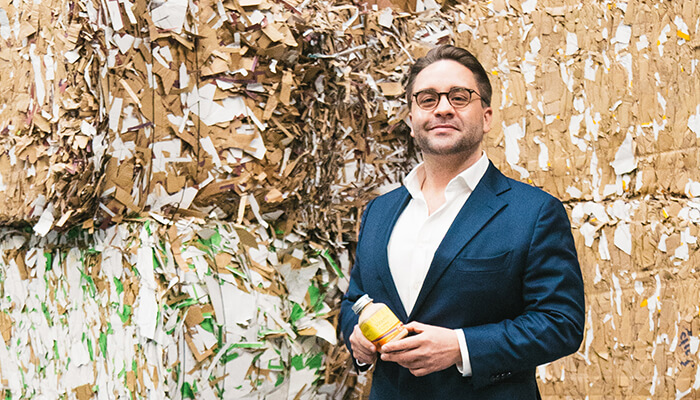Incredibly, some innovations can be on the shelf within one month, on a global scale
By David MacDonald, owner of Cullen Eco-Friendly Packaging, EY Entrepreneur of the Year Transformational Leader and Wired Trailblazer of the Year 2022. The climate change clock is ticking faster, according to a new UN report. Thankfully, there are feasible and effective solutions on the table, but the UN’s climate chief, Hoesung Lee, warned: “We are walking when we should be sprinting.” I believe that we already have the ability to sprint and quickly solve some of the climate issues reported by the UN, and my view is that entrepreneurs hold the key.
As the owner of a company that has replaced more than one billion pieces of plastic packaging with recyclable, compostable and biodegradable alternatives in the past two years, Cullen Eco-Friendly Packaging, I’m well placed to give an entrepreneur’s view on solving the toughest issues. The good news is, there’s reason for optimism.
Here’s how we can regain control in the struggle against the climate crisis.
1. Follow the UN’s urgent climate ‘to-do’ list
As part of their report, the UN helpfully shared a solutions to-do list.
One of the key problems to solve is protecting natural ecosystems that trap carbon. And a way to do this is to remove the amount of plastic in the environment. Did you know that a recent study estimated 171 trillion pieces of plastic waste in our oceans, damaging ecosystems? So what we need to do is replace as much plastic as quickly as possible.
For food and drink producers, and retailers that sell their products, they need to switch to plastic replacements now. We work closely with Plastic Planet’s Co-Founder, Sian Sutherland, who thinks that businesses, not consumers, must take responsibility. Consumer recycling isn’t working, only 9% of plastic waste collected is actually recycled and there’s no indication that it will work in future. So rather than ask consumers to recycle, we must give them products which nature can take back, such as compostable and biodegradable packaging made from paper like corrugate or moulded fibre. To do so, however, they need those alternatives in serious volume, at a global scale.
That’s where entrepreneurs like me come in. Along with others, we have developed ways to replace plastic packaging so that natural ecosystems can recover. Doing this with goods that we use in their billions every year creates a fast, low-cost, high-value way to slow climate change.
Thankfully producers and retailers are on board. They all have a plastic replacement agenda and many are actively working with us. We supply all major supermarkets and have long-standing relationships with a huge number of retailers across a variety of sectors in 34 countries. We’re experiencing increased demand for sustainable alternatives to single-use plastic packaging.
The Promise of Carbon Capturing: A New Way to Combat Climate Change
Carbon capturing and storage (CCS) is a process by which carbon dioxide (CO2) is captured from sources such as power plants and industrial processes and then stored in geological formations, such as depleted oil and gas reservoirs, deep saline reservoirs, and deep ocean basins, rather than being released into the atmosphere. It is being researched and developed as a way to reduce the amount of atmospheric CO2 emissions, thus reducing the rate of climate change. Carbon capture and storage is also known as carbon sequestration, carbon capture and sequestration, carbon dioxide capture and sequestration, and carbon dioxide removal. Carbon capturing is one of the most promising technologies in the fight against climate change.
2. Look to innovative entrepreneurial businesses
Where are the best innovations coming from to solve this problem fast? Entrepreneurs, that’s where. Companies like Notpla, and mine, Cullen Eco Packaging. The former won the esteemed Earth Shot Prize last year for their work in sustainable packaging; and I was humbly awarded the EY Entrepreneur of the Year 2022, UK Transformational Leader award, not least due to my innovations with sustainable packaging material, moulded fibre at Cullen. Entrepreneurs like us are dominating these innovation awards because our work is making an absolutely crucial and urgent impact on the world’s most pressing challenge, plastic waste.
As the UN clearly states, urgency is needed to solve our burning climate issues. Speed is an innovative entrepreneur’s normal way of working. I can’t speak for others but in my case, when a major retailer walks me down the supermarket aisle, I can pick up an existing plastic package and confidently say we’ll have a compostable replacement, made of moulded fibre, on a shelf within a month. And I mean every shelf in all of their stores. That’s urgent but with the quality control and scale needed to make a significant difference.
Speed is nothing if it cannot be done at scale. When you have trillions of pieces of plastic in the ecosystem and need to stop trillions more from entering it, you have to be capable of manufacturing plastic replacements in the quantities that humans buy them and in the geographies they consume them.
In the true entrepreneurial spirit, at my company Cullen Eco-Friendly Packaging, we don’t just design sustainable packaging, and we don’t just manufacture it, we also make our own machines and tooling to produce them. This makes us unique and one of few who have the scale, capacity and expertise to make bespoke plastic replacements within one month for specific producers and retailers at a global scale.
3. Embrace difficulty
It’s said that you can’t solve a problem with the same thinking that got you into that problem in the first place. At the same time, new solutions–innovations–have their own challenges. The entrepreneurial mindset, thankfully, is to embrace tough challenges.
A new innovation can be exciting but the novelty can be an obstacle. The head of sustainability at a national or international supermarket might not even be aware that there are sustainable replacements for their plastic packaging. The simplest solutions can be the best so I’ve found that my team literally going in-store with them and showing which pieces can be replaced now can be effective. More than that, it’s satisfying to see how relieved the world’s biggest brands are when they find out there are sustainable replacements for their plastic problems.
The sheer scale of the plastic packaging issue can be daunting, but there’s no point in waiting another ten years praying for a wonder material when we can look at how we can innovate with materials that we have to hand. Moulded fibre made from paper, in our case the recycled off-cuts from our corrugated facility is a perfect example. Abundantly available, we have built an infrastructure and machinery to produce billions of sustainable products using the material, from produce trays for fruit and vegetables to medical products for the health sector right through to a Fibre Bottle, a paper bottle replacement for plastic bottles and pouches for dry goods such as vitamins, spices, household cleaning products and much more.
The next difficulty is replicating the sheer variety of plastic packaging shapes, at scale. Simply buying a machine that will do it all isn’t possible, which is why we build them ourselves in-house and given how unique every package for each producer and retailer is, we also design and engineer the bespoke tooling. To continue to meet the soaring demand we recently led a £15m internal expansion investment and created over 120 green jobs.
Failure just isn’t an option. Overcoming difficulty is essential. Thankfully, as far as solving the plastic packaging problem, we have a solution here and now for billions of units that can be deployed at speed. It doesn’t solve every sustainability problem, but it makes a huge impact. And as more producers and retailers switch, it gives me a reason to feel optimistic that we can slow the damage down to a gradual stop.



